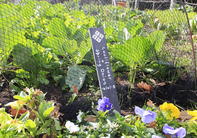Companion planting and intercropping is when two or more crops, both beneficial to each other, are planted in close proximity of each other as they chemically enhance (or can inhibit) each other’s growth and increase yield.

A study Investigating the Effects of Companion Plantings on Predation of European Corn Borer Eggs in Bell Peppers conducted in 2005 and 2006 in New Jersey, USA found that intercropping of dill, coriander and buckwheat with bell peppers significantly increased the presence of beneficial insects, which lowered the damage done by European corn borers, a major predator.
Companion planting is meant to increase the biodiversity of the environment and has many advantages in organic farming. Apart from increasing the biodiversity, intercropping and companion planting will also help to improve soil quality and as a result the availability of nutrients in the soil.
Beneficial Companion Plants
Sometimes just a few plants are interspersed between a crop, for example, a few cabbages planted in between a crop of pumpkin. Aphids are attracted to the cabbage and will ignore the pumpkins. Another good example is when maize, runner beans and pumpkin are intercropped.
Beans supply nitrogen to the soil, maize acts as a structural support for the bean tendrils and protects pumpkin against squash vine borers while the pumpkin will cover the soil surface and limit weed growth. Inversely, certain plants may suppress others or be detrimental to its growth, for example beans should not be combined with onions or fennel, and cabbage and tomatoes should not be combined.
Some plants (rosemary and Artemisia afra - African wormwood) are natural insects repellents. Other plants such as carrots, fennel and yarrow attract beneficial insects such as wasps, ladybirds and hoverflies. Often, herbs are used as companion plants. See the table below for tips on how plants can be combined to benefit each other.
Best and Worst Companion Plants
Surplus People Project’s (SPP) manual for organic agriculture ‘Basic Principles for Organic Cultivation and Livestock Production’ recommended the following companion plants:
Vegetable: Beans
Likes companion plant: Marigolds, beetroot, cabbage, carrot, cauliflower, celery, cucumber, maize, potato, strawberries
Dislikes: Dill, fennel, all members of the onion family
Vegetable: Beets
Likes companion plant: Asparagus, onion, kohlrabi, bush beans, lettuce, cabbage family
Dislikes: Mustard, pole beans
Vegetable: Cabbage
Likes companion plant: Beetroot, celery, chives, dill, onions, rosemary, sage, thyme
Dislikes: Dill, fennel, all members of the onion family
Vegetable: Carrot
Likes companion plant: Basil, chives, lettuce, onions, peas
Dislikes: Broccoli, cabbages, cauliflower, dill, fennel, potatoes
Vegetable: Celery
Likes companion plant: Marigolds, beans, broccoli, cabbages, leeks, parsley, spring onions, tomatoes
Dislikes: None
Vegetable: Cucumber
Likes companion plant: Beans, green peppers, lettuces, nasturtiums, radishes
Dislikes: Herbs, melons, potatoes
Vegetable: Eggplant
Likes companion plant: Basil, beans, lettuce, peas, potatoes, spinach
Dislikes: None
Vegetable: Kale
Likes companion plant: Cabbage, dill, potatoes, rosemary, sage
Dislikes: Strawberries, tomatoes
Vegetable: Lettuce
Likes companion plant: Beetroot, cabbages, carrots, radishes, strawberries
Dislikes: Broccoli
Vegetable: Oats
Likes companion plant: Brinjals, green peppers, strawberries, tomatoes
Dislikes: None
Vegetable: Melons
Likes companion plant: Garlic, chives, mint
Dislikes: Citrus trees, potatoes, radishes, sweet potatoes
Vegetable: Onions
Likes companion plant: Beetroot, cabbages, carrots, lettuces, peppers, spinach, strawberries, tomatoes
Dislikes: Beans, peas, sage
Vegetable: Peas
Likes companion plant: Carrots, potatoes, radishes, leafy greens, eggplant
Dislikes: Garlic, onions
Vegetable: Peppers
Likes companion plant: Beans beetroot, carrots, celery, lettuces, maize, parsley, pumpkin, radishes
Dislikes: Beans
Vegetable: Potato
Likes companion plant: Beans, broccoli, cabbage, eggplant, kale, marigolds, maize, onions, peas, strawberries
Dislikes: Cucumber, melons, pumpkins, squash, sunflowers, tomatoes, turnips
Vegetable: Pumpkins
Likes companion plant: Beans, garlic chives, maize, radishes
Dislikes: Potatoes
Vegetable: Soya bean
Likes companion plant: Maize, soya bean will benefit any plant growing nearby
Dislikes: None
Vegetable: Sunflower
Likes companion plant: Maize
Dislikes: Beans, potatoes
Vegetable: Swiss chard
Likes companion plant: Beetroot, beans, cabbages, celery, green peppers, onions, peas, strawberry
Dislikes: Grapes, potatoes, sage
Vegetable: Tomatoes
Likes companion plant: Marigolds, basil, carrots, celery, chives, onions, parsley, sage, stinging nettles
Dislikes: Kohlrabi, potato, fennel, cabbage, corn